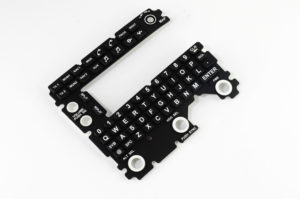
Keypads are available in different sizes. Some of them are thick and consume a lot of space. Other keypads, conversely, feature a thin and low-profile design. Known as ultra-thin keypads, they are commonly used in human machine interfaces (HMIs), ATMs, control panels and more. Even if you’ve used an ultra-thin keypad before, though, you might be wondering how they are made.
PC Injection
Most ultra-thin keypads are made via a manufacturing process known as polycarbonate (PC) injection. PC is a type of thermoplastic. It contains carbonate in its chemical makeup. PC injection is a manufacturing process that involves the injection of heated PC into a mold cavity.
PC injection is essentially a molding technique. It’s used in the manufacturing industry to create custom objects out of a mold. A mold is first created in the shape of the desired object. Next, heated PC is injected into the hollow center of the mold.
Ultra-Thin vs Metal Keypads
There are ultra-thin keypads, and there are metal keypads. They both consist of switches and corresponding keys. Ultra-thin keypads, however, are made of PC, whereas metal keypads live up to their namesake by being made of metal
Benefits of Ultra-Thin Keypads
What benefits do ultra-thin keypads offer exactly? When compared to metal keypads, ultra-thin keypads typically cost less. They are made of PC. As previously mentioned, PC is a type of thermoplastic. And like most thermoplastics, PC is a relatively inexpensive material. It costs less than most metals. If you’re looking to buy keypads in bulk, you may want to choose ultra-thin keypads to save money.
The main benefit of ultra-thin keypads is their size. They are thinner than their metal counterparts. You can even order them in custom sizes. If you need a keypad of a particular size, an ultra-thin keypad may be the answer. Ultra-thin keypads support custom sizes due to their PC injection manufacturing process.
While thin, ultra-thin keypads are incredibly durable. They support a surface coating hardness rating of up to 1H. They don’t scratch easily, nor are they are susceptible to water or liquid damage. Ultra-thin keypads are durable and long-lasting.
In Conclusion
Ultra-thin keypads are switch interfaces that are typically made via PC injection. A thermoplastic known as PC is heated, after which it’s injected into a keypad mold. The PC is then allowed to dry and harden. When the casting is removed, it will feature the necessary size and shape.
